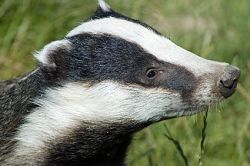

An independent scientific assessment of last year's pilot badger culls in Gloucestershire and Somerset has concluded that they were not effective.
The Government commissioned analysis found that the number of badgers killed fell well short of the target deemed necessary, and more than 5% of badgers took longer than five minutes to die, meaning the cull failed the test for humaneness. The pilot culls were intended to limit the spread of TB in cattle by carrying out a controlled reduction in the population of local badgers. Contracted marksmen were employed to shoot the animals at night.
Professor Rosie Woodroffe, a scientist at the Zoological Society of London, said that the panel's "findings show unequivocally that the culls were not effective and that they failed to meet the humaneness criteria. I hope this will lead to the Secretary of State (Owen Patterson) to focus on other ways of eradicating TB in cattle".
The pilots were authorised by the Department for Environment, Food and Rural Affairs (Defra) and licensed by Natural England, with the target for marksmen to kill at least 70% of badgers in the cull area within a six-week period. The analysis found that in actual fact, less than half of badgers were killed. In addition, Defra set a standard for no more than 5% of badgers to take more than five minutes to die. This time limit was exceeded by between 6.4% and 18% of animals shot.